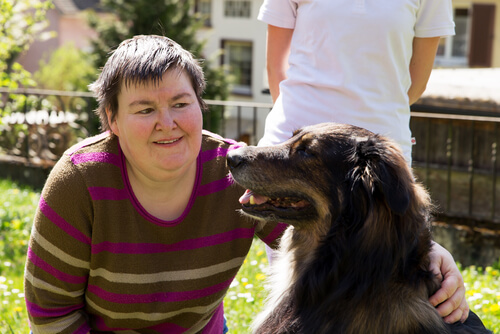
Page contents
From finding it difficult to learn new skills and process information to challenges with communicating and interacting with other people, a learning disability can affect a person’s life in a range of different ways.
If a person with a learning disability is unable to live independently at home or with the help of a family member or friend, moving to a care home could be a good option.
Many residential and nursing care homes across the UK welcome people with varying degrees of learning disabilities, and some specialise in supporting people with learning disabilities, mental health problems and challenging behaviour.
Who is a learning disability care home for?
Learning disability care homes are often small in size as residents’ needs tend to be high, meaning they require frequent care, support and supervision.
Despite their smaller size, they are purposely designed for disabled people with specialist facilities such as sensory rooms. They also give people with disabilities opportunities to socialise and form friendships.
The aim is to support each resident to lead a fulfilling, happy life regardless of the challenges they face.
People who live in a care home for people with learning disabilities may have one or more of the following conditions:
- Autism Spectrum Disorder
- Asperger’s Syndrome
- Down’s Syndrome
- Williams Syndrome
- Rett Syndrome
- Prader-Willi Syndrome
- Cerebral Palsy
- Tourette’s Syndrome
- Brain injury
How are residents supported in a care home for people with learning disabilities?
Like other care homes, residents with a learning disability receive support with daily tasks and personal care. They offer a safe space for people to live, with care services tailored to residents’ needs, preferences and goals.
These homes often offer a wide range of activities to support residents to develop their skills. This could be anything from vocational, social, education and life skills to enable them to be more independent.
The level of care provided will depend on whether a resident has moderate, severe or profound and multiple learning disabilities.
For example, someone with moderate learning disabilities may only need basic personal care and companionship in a care home. However, a person with severe learning disabilities may struggle significantly with mobility, speaking, hearing and eating.
For those requiring complex care, staff are able to help with everything from eating and drinking to washing and going to the toilet.
Finding a care home
There are a few ways to find residential care for a person with a learning disability.
To start with, it is recommended to ask your local authority for a Needs Assessment. They will be able to recommend what type of care you need and how it can be provided.
If the local authority agrees to help fund your care home fees, they will also help arrange which care home you will stay in. If you want to move into a specific care home with the help of your local authority, a family member or friend can pay top-up fees to enable this.
If you are a self-funder, you can find a suitable care home yourself.
carehome.co.uk lists all homes registered with their country’s regulatory body. You can browse relevant care homes by following the link below.
Find learning disability care homes
Find your ideal care home
- Explore a wide range of care options and facilities
- Read independent ratings and reviews
- Connect directly with care homes to book a tour and discuss your needs


